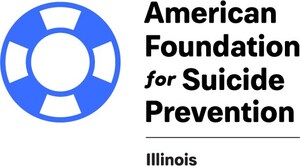Advocates to Visit Boston to Encourage Their Legislative Leaders to Invest in Suicide Prevention
BOSTON, April 12, 2017 /PRNewswire-USNewswire/ -- Five times as many die by suicide in Massachusetts annually than by homicide. To help prevent this tragic loss of life, volunteer advocates from the Massachusetts chapters of the American Foundation for Suicide Prevention are visiting the state capitol on Thursday, April 13th to ask their state legislative leaders to support the Department of Public Health (DPH) state fiscal year 2017 budget line item for suicide prevention at $4.6 million, and appropriate funds for tracking the training of school personnel in suicide prevention, and implementing follow-up services for patients discharged from hospital and inpatient settings. AFSP advocates are partnering with members of the Massachusetts Coalition for Suicide Prevention to visit the capitol.
"State legislators need to know that they can be the voice for those who desperately need one. We are talking to our leaders to help them understand the stories of those of us who have lost someone to suicide and those who experience thoughts of suicide. It's only by joining together that we will be able to save lives in the state of Massachusetts," said Michele Lee, Eastern Massachusetts Associate Area Director and AFSP advocate. Michele became a volunteer with the Greater Boston Chapter of AFSP in 2015. She lost her father Keith Lee to suicide in 2005. Mr. Lee was a police officer when he died.
Since the state's fiscal budget year 2002, Massachusetts legislators have recognized the scope of the problem of suicide and self-inflicted injuries in the Commonwealth by funding a line item for suicide prevention in the DPH budget. Massachusetts was one of the first states to create such a line item. Massachusetts has one of the lowest suicide rates in the country, showing the value these services and programs have provided to state residents and long-term benefit of lives saved.
Funds from the suicide prevention line item support a wide range of suicide prevention, intervention, and postvention efforts across Massachusetts, including:
- Helplines and crisis teams
- Gatekeeper training and education
- Depression screenings
- Support groups for loss survivors
- Services targeted for veterans, older adults, LGBTQ populations, and youth
- 10 Regional Coalitions across the state
School personnel who interact with children and teens on a daily basis are in a prime position to recognize the risk factors and warning signs of suicide, and to make the appropriate referrals for help. Existing Massachusetts law requires that all public school districts and commonwealth charter schools provide at least two hours of suicide awareness and prevention training every three years to all licensed school personnel, within the framework of existing in-service training programs or professional development activities. The advocates are asking for there to be a tracking system to ensure all of these training sessions happen.
It is estimated that only 50 percent of individuals who receive treatment in the Emergency Department or are hospitalized for suicide attempts or self-injury never receive follow up treatment. Of the 50 percent who do receive treatment, only half attend more than one appointment. Based on available research, AFSP advocates are insisting that follow-up services be conducted by experienced and trained volunteers at crisis centers who are able to assess suicide risk and provide interim support.
The advocates are part of a larger national movement of AFSP volunteer advocates who will be visiting 35 state capitols across the United States in spring 2017 to bring best practices in suicide prevention to state legislators.
Suicide in Massachusetts
Suicide is the twelfth leading cause of death overall in Massachusetts. For people aged 15-34 in Massachusetts, it is the second leading cause of death. For those aged 10-14, it is the third leading cause of death. On average one person dies by suicide every 14 hours in the state.
The American Foundation for Suicide Prevention is dedicated to saving lives and bringing hope to those affected by suicide. AFSP creates a culture that's smart about mental health through education and community programs, develops suicide prevention through research and advocacy, and provides support for those affected by suicide. Led by CEO Robert Gebbia and headquartered in New York, AFSP has local chapters in all 50 states with programs and events nationwide. AFSP celebrates 30 years of service to the suicide prevention movement. Learn more about AFSP in its latest Annual Report, and join the conversation on suicide prevention by following AFSP on Facebook, Twitter, Instagram, and YouTube.
SOURCE American Foundation for Suicide Prevention
Related Links
WANT YOUR COMPANY'S NEWS FEATURED ON PRNEWSWIRE.COM?
Newsrooms &
Influencers
Digital Media
Outlets
Journalists
Opted In





Share this article